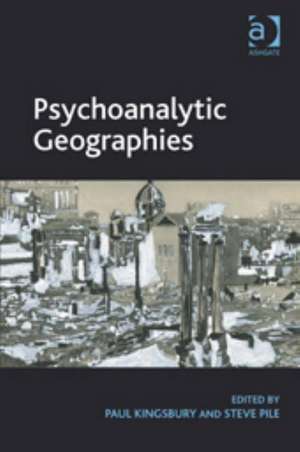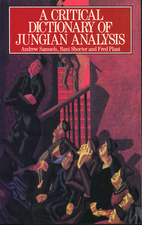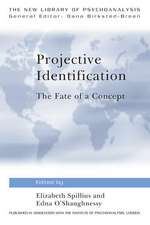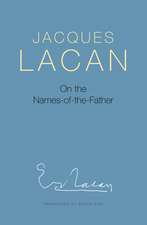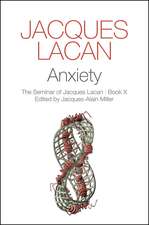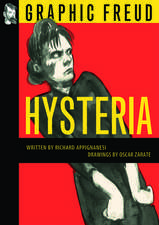Psychoanalytic Geographies
Autor Paul Kingsbury, Steve Pileen Limba Engleză Paperback – 28 mai 2014
| Toate formatele și edițiile | Preț | Express |
|---|---|---|
| Paperback (1) | 459.05 lei 6-8 săpt. | |
| Taylor & Francis – 28 mai 2014 | 459.05 lei 6-8 săpt. | |
| Hardback (1) | 1066.55 lei 6-8 săpt. | |
| Taylor & Francis – 28 mai 2014 | 1066.55 lei 6-8 săpt. |
Preț: 459.05 lei
Nou
Puncte Express: 689
Preț estimativ în valută:
87.84€ • 91.12$ • 73.25£
87.84€ • 91.12$ • 73.25£
Carte tipărită la comandă
Livrare economică 27 martie-10 aprilie
Preluare comenzi: 021 569.72.76
Specificații
ISBN-13: 9781409457619
ISBN-10: 1409457613
Pagini: 374
Ilustrații: Includes 35 b&w illustrations
Dimensiuni: 156 x 234 x 20 mm
Greutate: 0.68 kg
Ediția:New ed
Editura: Taylor & Francis
Colecția Routledge
Locul publicării:Oxford, United Kingdom
ISBN-10: 1409457613
Pagini: 374
Ilustrații: Includes 35 b&w illustrations
Dimensiuni: 156 x 234 x 20 mm
Greutate: 0.68 kg
Ediția:New ed
Editura: Taylor & Francis
Colecția Routledge
Locul publicării:Oxford, United Kingdom
Notă biografică
Paul Kingsbury is Associate Professor in the Department of Geography at Simon Fraser University. His research uses the social theories of Jacques Lacan and Friedrich Nietzsche to explore cultural geographies of power and aesthetics. He is the author of numerous journal articles and the co-editor (with Gavin Andrews and Robin Kearns) of Soundscapes of Wellbeing in Popular Music (2014). Steve Pile teaches Geography in the Faculty of Social Sciences at The Open University, UK. He has published on issues concerning place and the politics of identity. He is author of Real Cities (2005) and The Body and The City (1996). He is currently working on early Freudian psychoanalysis and geographies of the body.
Recenzii
’This volume derails the common assumption that geography is a simple study of earth's basic inertness. Far more than the topography of volumes and voids, geography concerns itself with a dynamic topology of knots, twists, buckles, and folds, which constitute the relations between earth and earth-bound subjects. Through a variety of psychoanalytic approaches, the essays compellingly demonstrate that the unconscious of these subjects operate as the underside of geographical exteriority.’ Joan Copjec, Brown University, USA ’For anyone looking for a comprehensive guide to the complex relations between psychoanalysis and geography, this is the book! Kingsbury and Pile’s collection is a must read.’ Anthony Elliott, Hawke Research Institute, Australia '... this book has hit the mark in achieving its stated aim to present to readers as wide a set of options for taking psychoanalysis forward in their own work as possible; and, second, to demonstrate the breadth,depth, and promise of cutting-edge work in psychoanalytic geographies' Antipode '... this book is a success. The enthusiasm, promise, and diversity - all pledged by the editors - is evident. ... this is a rich, challenging, and exciting book which assembles a set of provocative, thoughtful, and wide-ranging chapters.' Social & Cultural Geography
Cuprins
Preface, Paul Kingsbury and Steve Pile; Introduction: the unconscious, transference, drives, repetition and other things tied to geography, Paul Kingsbury and Steve Pile. Part I Histories and Practices: Freud in the field: psychoanalysis, fieldwork and geographical imaginations in interwar Cambridge, Laura Cameron and John Forrester; On Freud's geographies, Liz Bondi; Consulting rooms: notes towards a historical geography of the psychoanalytic setting, Felicity Callard; 'Worlding' psychoanalytic insights: unpicking R.D. Laing's geographies, Cheryl McGeachan; Mapping trauma: topography to topology, Virginia L. Blum and Anna J. Secor. Part II Psychic Life and its Spaces: Geographies of psychic life, Joyce Davidson and Hester Parr; A distributed unconscious: The Hangover, what happens in Vegas and whether it stays there or not, Steve Pile; 'Or does it explode?' Psychoanalytic geographies of violence and creativity in a small Mexican city, Karen Rodriguez; 'Tehrangeles', CA: the aesthetics of shame, Nazanin Naraghi; Psychoanalysis and the geography of the Anthropocene: fantasy, oil addiction and the politics of global warming, Stephen Healy. Part III The Technologies of Becoming a Subject: When 1+1 does not equal 2: childhood sexuality and Laplanche's enigmatic signifier, Mary E. Thomas; Towards a psychoanalytic geopolitics: the militarization of public schooling in the USA, Ian G.R. Shaw, Jared Powell and Jessica De La Ossa; 'Welcome home our military sisters': sexual difference and female veterans with PTSD, Deborah Thien; Periscope down! Charting masculine sexuation in submarine films, Jesse Proudfoot and Paul Kingsbury. Part IV Social Life and its Discontents: 'Race', imperializing geographies of the machine, and psychoanalysis, Heidi J. Nast; A small narrow space: postcolonial territorialization and the libidinal economy, Maureen Sioh; The uncanny in the beauty salon, Elizabeth R. Straughan; What does it mean for young women to get drunk? A Kleinian perspective on young women's relationship with alcohol, Melissa Stepney; Gender, sexuality, and race in the Lacanian mirror: urinary segregation and the bodily ego, Sheila L. Cavanagh. Index.
Descriere
Psychoanalytic Geographies is a unique, path-breaking volume and a core text for anyone seeking to grasp how psychoanalysis helps us understand fundamental geographical questions, and how geographical understandings can offer new ways of thinking psychoanalytically. Elaborating on a variety of psychoanalytic approaches that embrace geographical imaginations and a commitment toward spatial thinking, this book demonstrates the breadth, depth, and vitality of cutting-edge work in psychoanalytic geographies and presents readers with as wide a set of options as possible for taking psychoanalysis forward in their own work.
